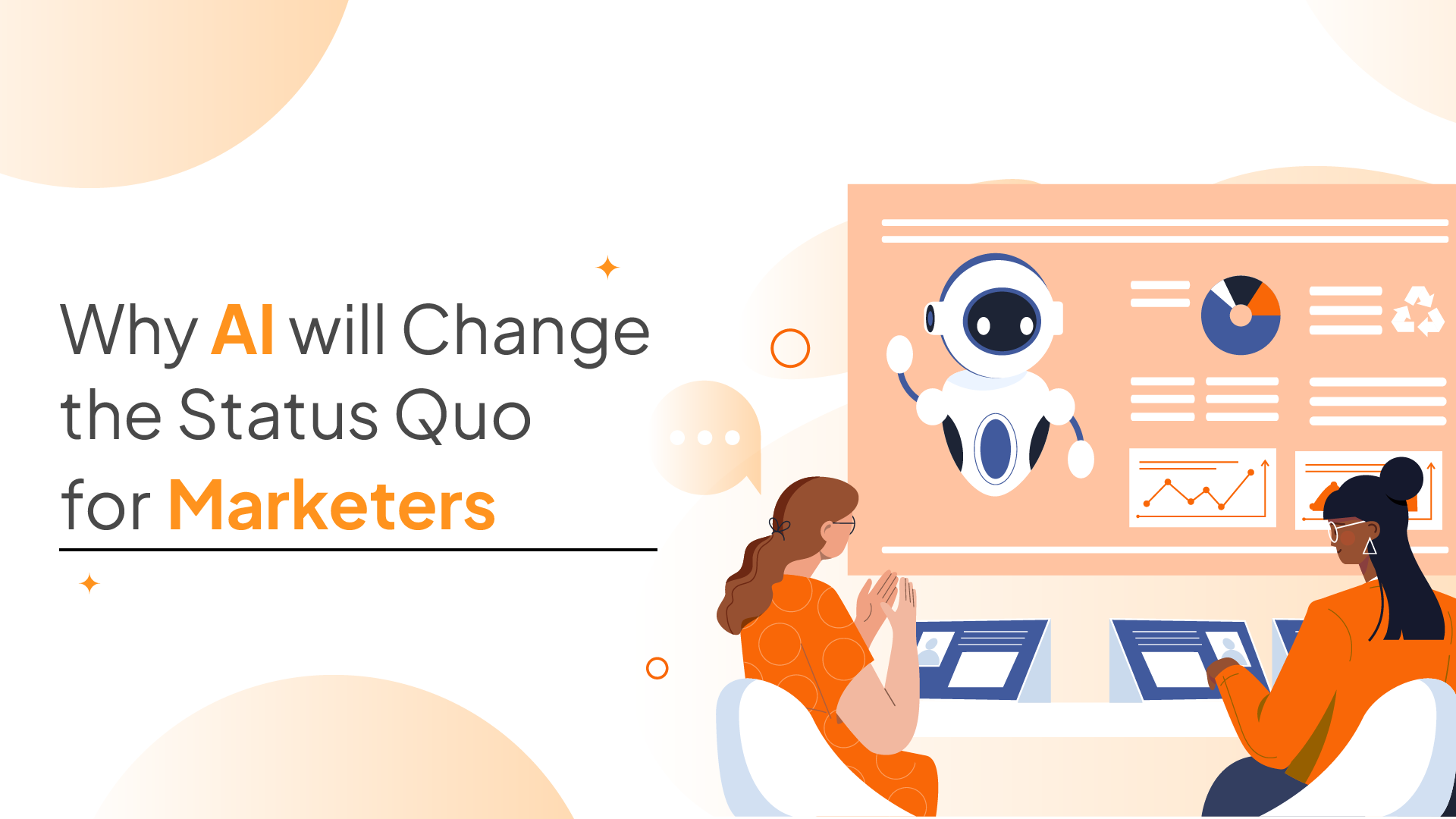

artificial intelligence marketing
Why AI will Change the Status Quo for Marketers
Why AI will Change the Status Quo for Marketers
It’s no longer an if, but a when. AI is being used by marketers in more ways—and more quickly—than anyone could have anticipated. According to SurveyMonkey’s latest research, Marketing trends for a new era, 88% of marketers say they are using AI daily; and that may not include those behind-the-scenes use cases where it’s working in the background.
Marketers appear to be ahead of the curve and are embracing AI more rapidly than the organizations they support. Even though nearly half of marketers say increased adoption of AI is a top goal for their company, 44% also say their companies are waiting for more established solutions before they implement AI.
As a marketer, I wonder if the enthusiasm for AI stems from the need to address some real challenges. Three-quarters of marketers say the market will move at a faster pace this year, and 73% expect to face more competition in 2024, up significantly from just a year ago.
At the same time, almost nine out of ten marketers expect their team’s performance expectations to increase this year, also up from 2023. This data illustrates that teams cannot keep doing the same thing and expect the same results. We are in an era of change, and AI has the potential to be the game-changer we’re all looking for.
AI Shows Promise as the Use Cases Abound.
Seven out of ten marketers say they are excited about AI and its impact on their jobs, and that same amount (70%) say AI will play a larger role in their work over the next 5 years. There's a ton of excitement around using AI for things like content creation—from blog articles to presentations and scripts. The use cases are varied and the list of things AI can do is growing.
In addition to doing more, AI helps marketers do things better. Nine out of ten marketers say AI leads to faster decision-making, 93% say it helps them generate content more quickly, and 91% say AI can uncover insights faster. That time savings is critical—especially as companies set lofty goals for marketers.
These goals include getting closer to the customer with more personalized outreach. In our study, 55% of marketers report that delivering more personalized marketing efforts tops their list of goals, followed by strengthening customer relationships, which came in second at 53%.
But, just as marketers focus on personalization, new anti-tracking legislation, privacy laws and the phasing out of third-party cookies will kick in, eliminating a valuable source of third-party data from other websites.
First-party data will become more important, meaning that marketers will need to get creative about collecting data from visitors and shift away from the same-minded approaches that they’ve relied on. They’ll need to go back to basics and deliver more accurate segmentation, personalized outreach, engaging content, interesting storytelling, and unique ways of connecting.
That’s where AI could open a window where a proverbial door was closed. According to our study, marketers will put AI to work optimizing SEO and email campaigns, assisting with targeting, and doing the kind of research that will lead to more personalized and effective marketing. Half of marketers say they will use AI to generate, optimize, and brainstorm content, and around 40% say they will use it to automate tasks, analyze data, and conduct research.
The Common Denominator is Data.
If you’re a marketer, it may feel like a lot to get your arms around. New policies, new technologies, and new ways of working are all challenging the status quo. The entire industry is undergoing a shift from profiling to predicting, from tracking past actions to anticipating future needs.
For my team, we’re prioritizing how we think about data and plan to use it in new ways. The common denominator is to find out how much faster we can move by leveraging it. This includes figuring out where—and if—AI helps us, and seeing if our existing data streams can be ingested even more quickly. Needless to say, how data is collected, how it’s used to understand customers, and how it’s applied to campaigns is becoming more important than ever.
In 2023, 79% of marketers said their companies relied on data for decisions. For 2024, that number has increased by 11%, reaching 92%. In addition, 30% of marketers say data will fully determine their business decisions this year, an increase of 11 points. And the number of marketers who say they don’t rely on data has dropped by 11 points since 2023, to only 7%.
Net-net? Marketers seem to understand the assignment and are ready to adopt new ways of getting work done. Connecting with customers, creating more personalized marketing, and leaning into data-driven decisions—these are things we’ve been trying to do for years. And finally, it looks like we have what we need at our fingertips to make it happen.
As an optimist will tell you, change is good, and for marketers, change is the one constant we can count on. From the promise of AI to the possibility of really understanding what customers want and the ability to connect with them where they are; marketers might be able to reach these goals. Maybe that’s why 60% of marketers say they are very confident about where their industry is heading this year. I know my team is, and we plan to question how working and look for new ways to succeed.

Lara Belonogoff
Lara Belonogoff is the Senior Director, Brand Management at SurveyMonkey, where she leads the brand marketing, social media, video, content, research, and insights teams, driving the company’s brand efforts. Lara is an accomplished creative and strategist with more than 20 years of experience and expertise in a wide range of disciplines, including content strategy and copywriting, brand building and direction, digital media, and marketing. She holds a Bachelor’s degree in English from the University of California, Berkeley and an MFA from The New School.




